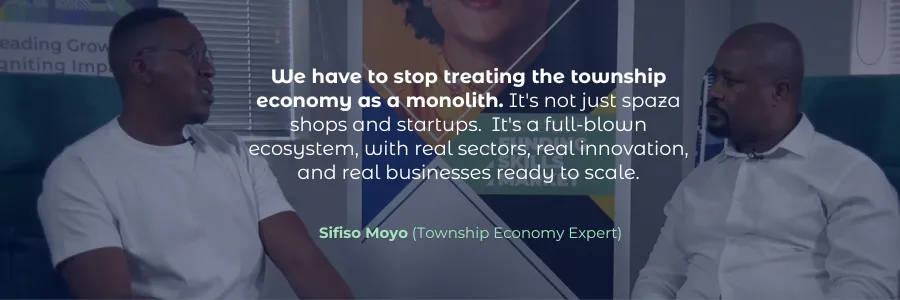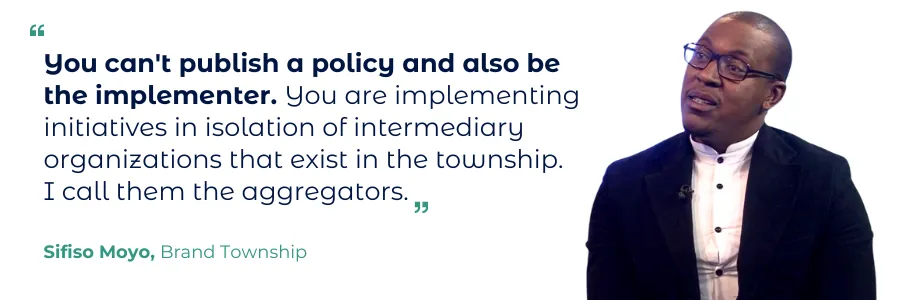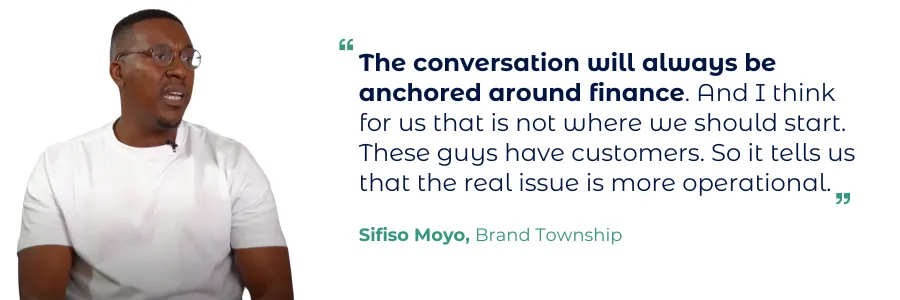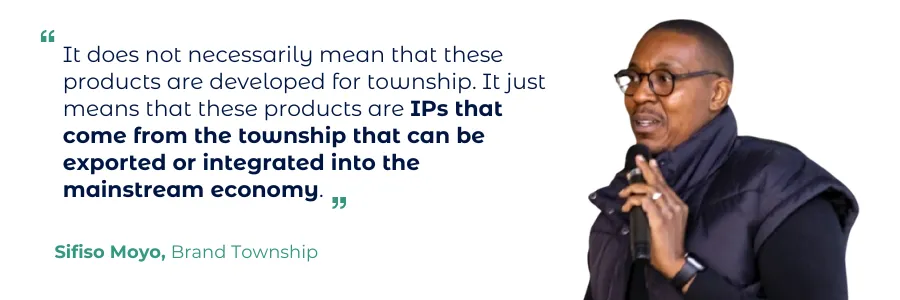A candid conversation with Sifiso Moyo reveals the overlooked dynamics and untapped potential of South Africa’s Township Economy.

This quote from Sifiso Moyo (Township Economy Expert and Founder of Brand Township) sums up the challenge we face when designing solutions for township entrepreneurs. Many of us don’t truly understand the intricacies of this market.
Truth is: Township entrepreneurs face unique challenges shaped by historical spatial planning and modern economic realities. This context demands more than generic approaches or well-intentioned funding – it requires strategic, sector-focused interventions that create mutual value.
In the latest episode of The Cutting Edge Podcast, Edge Growth’s Mbuso Radebe sat down with Sifiso to unpack the state of township economies, the structural barriers holding them back, and how corporate leaders and policymakers can stop treating townships as pet projects and start supporting them as strategic growth markets.
Let’s dive in..

1. The Township Economy Isn’t Just Surviving - It’s a R900 Billion Multisector Powerhouse
Township entrepreneurs represent the first or second generation of formal business owners in these spaces. People have been trading here for decades, often without recognition or support.
From apartheid-era spatial planning that confined communities and stifled economic growth, to the emergence of entrepreneurial hubs in Soweto, Tembisa, and Mamelodi – the township economy has always been present, just unacknowledged in mainstream economic strategies.
Yet the dominant narrative continues to reduce townships to informal trade and survivalist businesses. As Sifiso points out, corporates often narrow their view to just retail, specifically spaza shops, missing vast opportunities across multiple thriving sectors.

The opportunities being overlooked include:
🟢 Property development: “The backyard real estate market is a R10 billion sector just from rental,” says Moyo.
🟢 Energy solutions: Local entrepreneurs creating micro-grid solutions for electricity challenges
🟢 Tourism: Developing routes through historical sites or creating experiences in townships
🟢 Hospitality: Brands like Kuzi (started in Villa Gazi Street) are expanding to multiple outlets
🟢 Manufacturing: From prosthetics to food products like Unorthodox ready-to-eat meals
So what’s holding these businesses back?
It’s not just a lack of funding. “We always think the issue is capital,” says Sifiso. “But often, the issue is systems, value chains, and mentorship.” Many township businesses are self-funded, crowdfunded through stokvels, or bootstrapped through sheer resilience – but few have access to mentorship, supply chain infrastructure, or sector-specific support to professionalise and scale.
2. The Biggest Missed Opportunity? Township Intermediaries.
These are the organisations, entrepreneurship support hubs, incubators, and networks like the Township Economic Alliance, who are already embedded in the township ecosystem. They have deep networks within the township, deeper contextual understanding, and have built trust within the community. They have the relationships, credibility, and insight to guide development efforts.
One of the biggest mistakes corporates and funders make is bypassing township intermediary organisations when implementing development initiatives.

How corporate and funders can bridge this gap:
🟢 Partner with existing township intermediaries instead of implementing directly
🟢 Fund intermediary capacity building before going directly to entrepreneurs
🟢 Learn from success cases like the Township Entrepreneurship Alliance (TEA), which Nedbank sponsors with proven results.
3. Address Operational Foundations Before Funding
While many township entrepreneurs cite capital as their primary need, the real challenges often lie in operational fundamentals. Financial support without operational capability leads to high failure rates.

The smarter approach:
🟢 Help entrepreneurs with pricing and costing before giving financial support
🟢 Provide expertise for value chain streamlining and process optimisation
🟢 Assist with succession planning and governance for growing businesses
🟢 Develop technology integration for operational efficiency
4. Focus on Sector-Specific Solutions, Not Generic Approaches
Sifiso strongly argues for a sector-based approach to development – and it’s hard to disagree.
The township economy is diverse and complex. From hospitality and logistics, to backyard real estate and solar energy, the township economy includes:
✔️ A R10bn+ backyard rental market
✔️ An informal meat sector generating R3k-R4k per trader, daily
✔️ Township-based microgrid energy pilots
✔️ Township-based prosthetics startups
✔️High-growth brands like eg Burger Yard with franchising potential
The problem? “These sectors are flying under the radar. And because of poor infrastructure and lack of tailored support, most of their innovations never scale,” says Sifiso.
Generic training and support programmes fail to address the unique challenges of different township business sectors. Each sector requires tailored approaches.
What sector-specific support looks like:
🟨 Design sector-focused interventions rather than one-size-fits-all programmes
🟨 Study sector-specific value chains and pain points
🟨 Target high-potential sectors like funerals, property, and transport with specialised solutions
🟨 Provide support for local distribution centres in retail and FMCG
🟨 Run franchising readiness programmes for standout township brands
🟨 Support township entrepreneurs in accessing the 40% procurement set-aside promised by the Township Economic Development Act
5. Build Integration into Mainstream Economy, Not Township-Only Markets
Many township products are viewed as suitable only for township markets, limiting their growth potential. This mental model needs challenging.

The path forward:
1️⃣ Help township businesses access broader markets beyond geographical boundaries
2️⃣ Recognise township innovations as intellectual property that deserves wider commercialisation
3️⃣ Create pathways for township businesses to integrate into formal supply chains
💭 A closing thought: Stop solving for the township economy - Start solving WITH it
From the outside looking in, the township economy might look like a puzzle. But for those inside it, it’s a lived experience. Solutions that don’t begin with that understanding are doomed to fail.
So if you’re a transformation executive, procurement leader, or ESD manager:
→ When was the last time you sat in a room with township intermediaries❔
→ How often does your strategy focus on scalable, sector-based interventions❔
→ Are your programmes aligned with the Township Economic Development Act❔
Because, as Sifiso says, “The township isn’t just a market. It’s an economy. And it’s time we started treating it like one.”

🎙️ Ready to dig deeper? The full episode of the Cutting Edge Podcast explores township economy opportunities in much greater depth. Listen to it here
💬 Join the Conversation: Has your organisation worked with township entrepreneurs? What approaches have yielded the best results? Share your experiences in the comments.

Podcast Host: Mbuso Radebe (Senior Programme Manager at Edge Growth)
Podcast Guest: Sifiso Moyo (CEO of the Township Economic Commission of South Africa)


